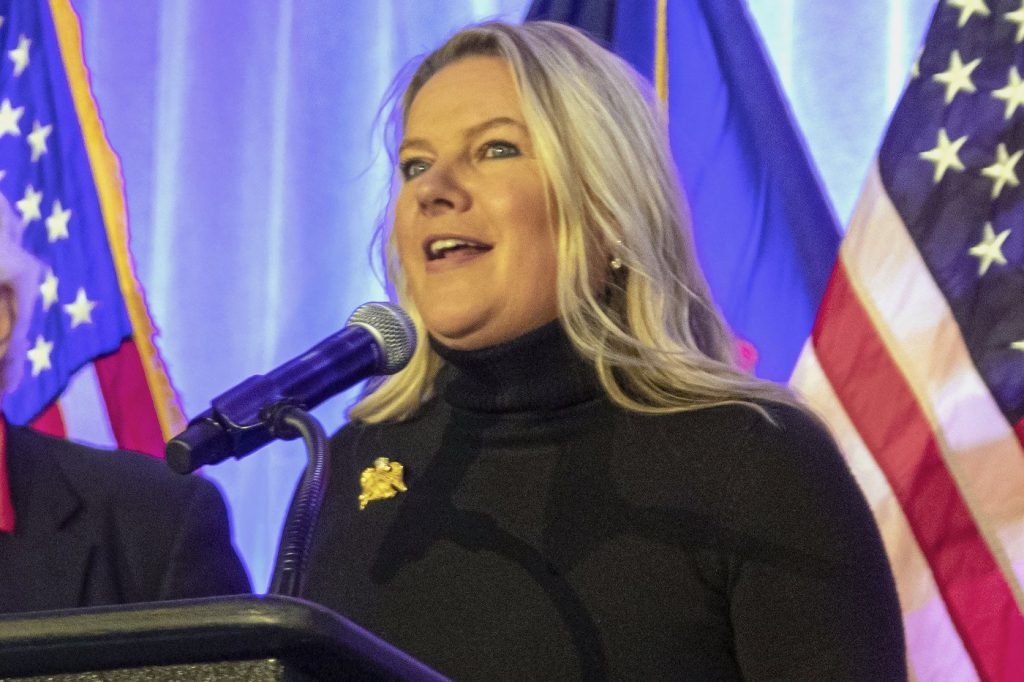DETROIT (AP) On Saturday, Michigan Republicans are convening in Detroit to elect a new chair, a pivotal decision that will shape the party's strategy leading into the crucial 2026 midterm elections. This period will feature several significant races, including a highly contested U.S. Senate seat, making the chairperson's role particularly critical.
Three candidates are competing for the party leadership. The most prominent among them is Meshawn Maddock, a MAGA activist, ally of former President Donald Trump, and the party's former co-chair. Maddock is currently facing eight charges of forgery and conspiracy linked to an alleged false elector scheme from the disputed 2020 presidential election. She contends that the charges are politically driven and expresses confidence that they will eventually be dismissed. Notably, Trump endorsed Maddock just days prior to the convention.
Additionally, State Senator Jim Runestad is vying for the chairmanship. Having been first elected to the state House of Representatives, Runestad has accumulated over a decade of experience in Michigan's state legislature. The final candidate, Joseph Cella, previously served as a Trump ambassador to several Pacific island nations, including Fiji and Tonga.
The backdrop of this election involves the allegations against Michigan's so-called false electors. In total, fifteen Republican individuals are accused of falsely claiming to be presidential electors for Trump in Michigan, despite Joe Biden's clear victory by nearly 155,000 votes in 2020. This scheme has led to criminal charges consisting of eight counts of forgery and conspiracy against the defendants, who maintain that their actions did not violate any laws. The Michigan Attorney General, Dana Nessel, a Democrat, has already dropped charges against one additional defendant in exchange for their cooperation.
As the current legal situation remains unresolved, Maddock and the other defendants await a decision from a district judge regarding whether there is sufficient evidence to proceed to trial, with their next court date set for March 28, shortly after the Republican convention.
The stakes for Michigan Republicans are high, especially considering the party's potential influence in the upcoming 2026 midterms. Democrats aim to reclaim control of the U.S. House and Senate, particularly targeting Michigan as a battleground state. Recently, U.S. Senator Gary Peters surprised many by announcing he will not seek reelection, thus opening up a competitive Senate seat. In the 2024 elections, Democrat Elissa Slotkin narrowly defeated Republican Mike Rogers for a Senate seat, with Rogers indicating plans for another run.
Furthermore, with Governor Gretchen Whitmer reaching the end of her term, various potential candidates are emerging to succeed her. The elections will not only determine the Senate and House dynamics but will also affect critical state offices, including those of attorney general and secretary of state. The control of the Michigan state legislature and two state Supreme Court seats will also be on the line.
The Republican Party in Michigan is still attempting to recover from a tumultuous period characterized by infighting and financial instability, which began with a contentious convention vote. The grassroots movement that led to the election of party chair Kristiana Karamo, a newcomer who denied the 2020 election results, significantly impacted party unity and finances. To stabilize the party, national Republicans and Trump have since chosen former congressman and ambassador Pete Hoekstra to replace Karamo, but Hoekstra is not seeking the position again as he has been nominated to serve as ambassador to Canada.
Simultaneously, Michigan Democrats are also selecting their next party chair on the same day. Former state lawmaker and congressional candidate Curtis Hertel Jr. is poised to be elected for this role after his unsuccessful bid for the U.S. House in 2024.










